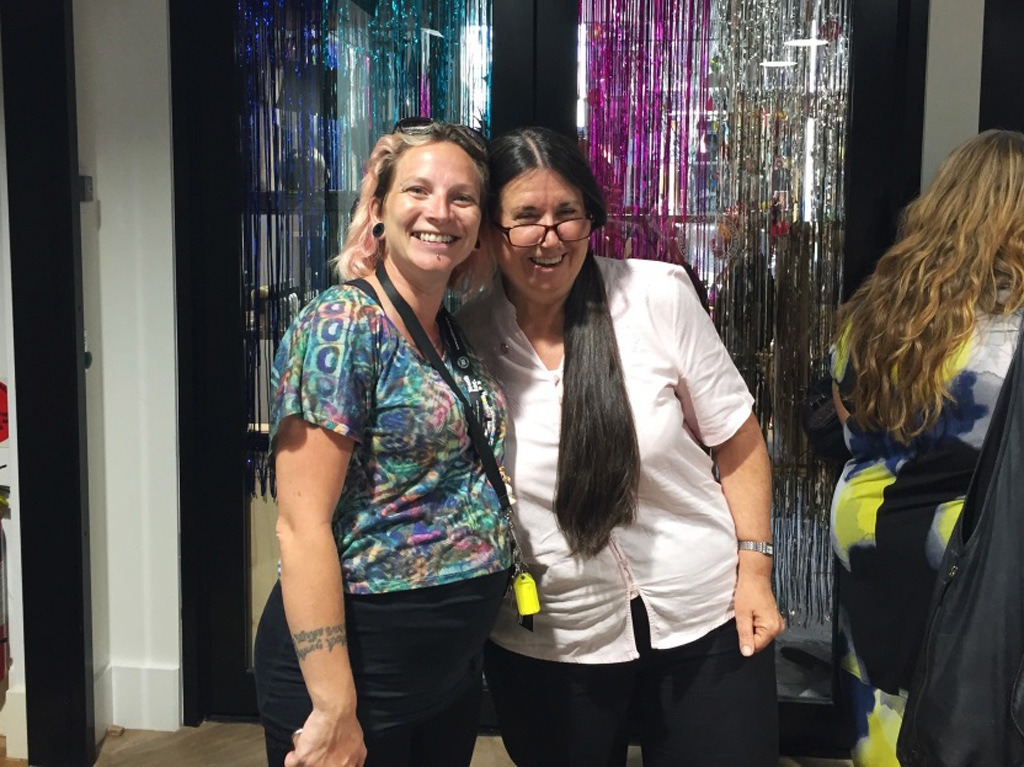Momentum Is Gaining For Social Enterprise In South Australia
Nia Lewis presenting her work at the launch of the Adelaide Social Enterprise group.
Three weeks ago, South Australia launched Adelaide Social Enterprise - a Meetup group that is modelled on Brisbane Social Enterprise. While Adelaide Social Enterprise is currently being co-organised by Sharon Zivkovic and Nia Lewis, the group intends to follow Queensland’s lead and form a South Australian version of the Queensland Social Enterprise Council (QSEC). QSEC is the peak body democratically representing Social Enterprise in Queensland, and it runs the Brisbane Social Enterprise Meetup group.
In the three weeks since Adelaide Social Enterprise was formed, 117 people have become members. Last night more than 30 of those members attended the launch of Adelaide Social Enterprise at the Youth Inc. Enterprise Academy, where Nia is employed as the Learning Architect.
At the launch, Sharon gave a presentation on how the lessons learned from the failure of Australia's first Social Entrepreneurs Network could be incorporated into Adelaide Social Enterprise and talked about the opportunity for Adelaide Social Enterprise to connect with similar groups interstate. Nia and Fred Heidt, the Principal/Director at Youth Inc., then shared with the members Youth Inc’s approach to education for young people and their students involvement in social enterprise activities.
The following are some of the key messages from Sharon’s presentation:
Social entrepreneurship and social enterprise came to prominence in Australian in 2000 with the release of the Australian Welfare Reform Final Report ‘Participation Support for a More Equitable Society’. That report highlighted four processes by which communities could build their capacity, one of these being social entrepreneurship. A key recommendation in that report was to support the growth of social entrepreneurship in Australia.
Riding on the momentum of the Welfare Reform Final Report, in February, 2001, Australia’s first Social Entrepreneurs Network was launched at a conference in Sydney titled “Social Entrepreneurs - Old Wine In New Bottles”. Over 500 people attended that first conference. Interest in the Network quickly grew and by 2002 the network expanded to become the Australia/New Zealand Social Entrepreneurs Network.
Sharon Zivkovic presenting on the 2000 Welfare Reform Final Report.
Unfortunately the Social Entrepreneurs Network only survived for three years, being formerly wound up and a liquidator appointed in February 2004. While the story of Australia’s first Social Entrepreneurs Network has never been written up as a case study, a couple of suggested reasons for the Network’s demise has been mentioned in publications. In Jo Barraket’s report “Community and Social Enterprise: What Role for Government?” prepared for the Department of Victorian Communities in 2006, it was highlighted that the different meanings the Network members attributed to the term ‘social entrepreneurship’ was a contributing factor behind the Network’s demise. Another underpinning factor was reported by Mark Lyons and Andrew Passey in their 2006 article “Need Public Policy Ignore the Third Sector? Government Policy in Australia and the United Kingdom”. Lyons and Passey identified that the first Australian Social Entrepreneurs Network never became broadly representative of social enterprises.
These two lessons from Australia’s first network were discussed at the Launch of Adelaide Social Enterprise:
the need to adopt a definition of social enterprise that is inclusive of the different meanings of social entrepreneurship, and
the need for the democratically elected organisation that will eventually run Adelaide Social Enterprise to be representative of South Australia’s social enterprises.
Nia Lewis and Sharon Zivkovic at the beginning of the launch.
In response to the definition issue, Sharon discussed how the definition of social enterprise from the 2010 Finding Australia’s Social Enterprise Sector research project was not only inclusive of the diverse meanings of social entrepreneurship, but it was also widely used by governments, funders and practitioners across Australia. By referring to the QSEC website, Sharon then showed how QSEC is representative of social enterprises in Queensland by having social enterprises as the voting members of the Council. It was also highlighted that the more recently established Social Enterprise Network Victoria (SENVIC), is also being formed and run by that state’s social enterprises.
At the end of the first Adelaide Social Enterprise meeting, Nia and Fred gave members a tour of Youth Inc. and its social enterprise Hustle & Heart. Youth Inc. Enterprise Academy is a nonprofit education organisation that assists young people to achieve formal SACE and VET qualifications using a project-based, action-learning approach which is heavily based in the local community. The Hustle & Heart Store is a social enterprise that is run by the Youth Inc students. Hustle and Heart supports ethical and local/independent brands to showcase and sell their goods.
The next Adelaide Social Enterprise Meetup event is being held 6pm-8pm on the 20th March at the Duke of Brunswick Hotel. All are welcome.
Fred Heidt presenting on the Youth Inc. journey.
About the author
Sharon Zivkovic has 20 years’ experience in social entrepreneurship. From 1999-2005 she supported citizens to create community enterprises while working on urban regeneration projects in South Australia. In 2005 she left the public sector and founded Community Capacity Builders which has been delivering social entrepreneurship and active citizenship programs since 2006.
In 2008 Sharon undertook a PhD research project to determine how to increase the impact of Community Capacity Builders’ programs. A key output from Sharon’s research was a model for addressing wicked problems that is based on complexity science. In 2015 Sharon and Emily Humphreys received the University of South Australia Pank Prize for Entrepreneurship which funded the establishment of Wicked Lab and the development of an online tool based on the model from Sharon’s PhD project. In addition to the online tool, Wicked Lab now delivers a Complex Systems Leadership Program and a program that supports Systemic Innovation Labs.








